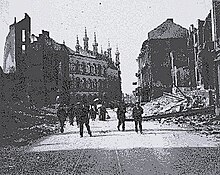Pemerkosaan Belgia
Pemerkosaan Belgia adalah istilah yang mengacu kepada tindakan buruk pasukan Jerman terhadap warga Belgia selama Perang Dunia I.

Kenetralan Belgia telah dijamin oleh Perjanjian London (1839) yang juga ditandatangani oleh Prusia. Namun, Rencana Schlieffen akan melanggar kenetralan Belgia dengan melintasi negara tersebut untuk mengejutkan pasukan Prancis yang terkonsentrasi di Prancis timur. Kanselir Jerman Theobald von Bethmann Hollweg mengabaikan perjanjian tahun 1839 dan menyebutnya sebagai "secarik kertas".[1] Pada permulaan perang, pasukan Jerman telah melakukan kejahatan terhadap warga sipil di Belgia, termasuk penghancuran properti sipil. Secara keseluruhan, 6.000 orang Belgia tewas, sementara 17.700 tewas selama pengusiran, deportasi, pemenjaraan, atau akibat penghukuman mati oleh pengadilan.[2] 25.000 rumah dan bangunan lain di 837 permukiman hancur pada tahun 1914, dan 1,5 juta orang Belgia (20% penduduk Belgia) melarikan diri dari serangan pasukan Jerman.[3]
Kejadian-kejadian ini dimanfaatkan oleh Sekutu untuk memperburuk citra Jerman.[4] Slogan "Pemerkosaan Belgia" juga dipakai di Amerika Serikat sebagai propaganda untuk memperkuat dukungan rakyat terhadap keterlibatan Amerika dalam Perang Dunia I.
Catatan kaki
- ^ Memoirs of Prince Von Bulow: The World War and Germany's Collapse 1909–1919, translated by Geoffrey Dunlop and F. A. Voight, Little, Brown and Company, Boston, 1932:
There is no doubt that our invasion of Belgium, with violation it entailed of that country's sovereign neutrality, and of treaties we ourselves had signed, and the world had respected for a century, was an act of the gravest political significance. Bad was made worse when than ever by Bethmans Hollweg's speech in the Reichstag (August 4, 1914). Never perhaps, has any other statesman at the head of a great and civilized people (...) pronounced (...) a more terrible speech. Before the whole world—before his country, this spokesman of the German Government—not of the Belgian!—not of the French!—declared that, in invading Belgium we did wrong, but that necessity knows no law (...) I was aware, with this one categorical statement, we had forfeited, at a blow, the imponderabilia; that this unbelievably stupid oration would set the whole world against Germany. And on the very evening after he made it this Chancellor of the German Empire, in a talk with Sir Edward Goschen, the British Ambassador, referred to the international obligations on which Belgium relied for her neutrality as "un chiffon de papier", "a scrap of paper"...
- ^ Annuaire statistique de la Belgique et du Congo Belge 1915–1919. Bruxelles. 1922 hlm.100
- ^ Lipkes J. (2007) Rehearsals: The German Army in Belgium, August 1914, Leuven University Press
- ^ Nicoletta Gullace (2002). The Blood of Our Sons: Men, Women, and the Renegotiation of British Citizenship during the Great War. Palgrave Macmillan. ISBN 978-0-312-29446-5.